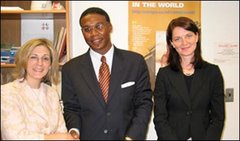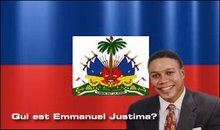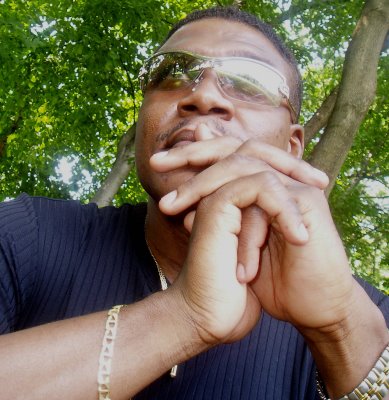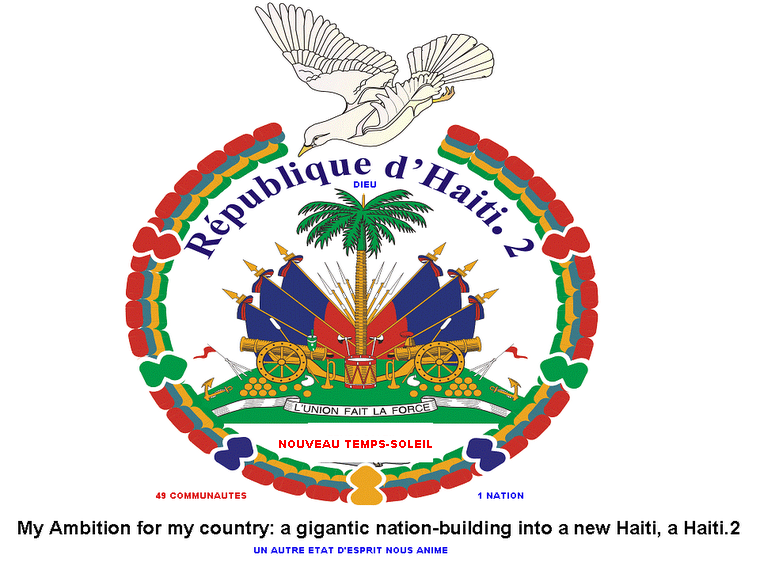Haiti's Hail to the Chief- L'Hymne Présidentiel Haïtien"Quand nos Aïeux brisèrent leurs entraves" (When our Fathers broke their Chains)Words by: Oswald Durand
Music by: Occide JeantyIn use: 1893-1903
In 1893 a visiting warship to the Haitian capital was required by protocol to perform the Haitian anthem. Since Haiti did not yet have an anthem, the composer Occide Jeanty offered to compose music for the patriotic poem "Quand nos Aïeux brisèrent leurs entraves."

This was completed that night and the anthem was debuted aboard the ship. It remained as an unofficial national anthem until a new one was chosen to mark Haiti's centennial on January 1, 1904. The former anthem still remains in use as a presidential salute.
The Next Generation of Presidential Leaders  HAITI's National Palace
HAITI's National PalaceSpecial thanks to: Jan Scotland for some of this information.
and to
http://www.nationalanthems.info/ht-03.htm
FRENCH LYRICS
Quand nos Aïeux brisèrent leurs entraves
Ce n'était pas pour se croiser les bras
Pour travailler en maîtres les esclaves
Ont embrassé corps à corps le trépas.
Leur sang à flots engraissa nos collines,
A notre tour, jaunes et noirs, allons!
Creusons le sol légué par Dessalines :
Notre fortune est là dans nos vallons.
CHORUS:
L'indépendance est éphémère
Sans le droit à l'égalité!
Pour fouler, heureux, cette terre
Il nous faut la devise austère :
Dieu! Le Travail! La Liberté!
Quoi de plus beau que ces fils de l'Afrique
Qui, trois cent ans dans tous les maux plongés,
Tournent leurs fers, leur carcan et leur trique
Contre la force et les vieux préjugés!
En bas voyez! c'est la noble bannière
Cernant les noirs qui vont mourir là-haut
Non! leur torrent avec Lamartinière
Descend fougueux à la Crête-à-Pierrot.
CHORUS:
Tout cela serait éphémère
Sans le droit à l'égalité!
Pour fouler, heureux, cette terre
Il nous faut la devise austère :
Dieu! Le Travail! La Liberté!
De Rochambeau les cohortes altières,
Quelques instants, suspendirent le feu
Pour saluer le Héros de Vertières,
Capois-la-Mort, grand comme un demi-dieu.
Vers le progrès crions comme ce brave :
"Noirs, en avant! En avant!" Et bêchons
Le sol trempé des sueurs de l'esclave!
Nous avons là ce qu'ailleurs nous cherchons
CHORUS:
Sans quoi tout devient éphémère
Pas d'ordre et pas de liberté
Pour fouler, heureux, cette terre
Il nous faut la devise austère :
Dieu! Le Travail! La Liberté!
Sang des martyrs dont la pourpre écumante
A secoué nos chaînes et nos jougs!
Chavanne, Ogé, sur la route infamante,
Toi, vieux Toussaint, dans ton cachot de Joux
O précurseurs, dont les dernières fibres
Ont dû frémir, - vous les porte-flambeaux -
En nous voyant maintenant fiers et libres,
Conseillez-nous du fond de vos tombeaux!
CHORUS:
Votre bonheur est éphémère;
Ayez droit à l’égalité!
Pour fouler, heureux, cette terre,
Il vous faut la devise austère:
Dieu! Le travail! La liberté!
A l’oeuvre donc, descendants de l’Afrique,
Jaunes et noirs, fils du même berceau!
L’antique Europe et la jeune Amérique
Nous voient de loin tenter le rude assaut.
Bêchons le sol qu’en l’an mil huit cent quatre,
Nous ont conquis nos aïeux au bras fort.
C’est notre tour à présent de combattre
Avec ce cri: "Le progrès ou la mort!"
CHORUS:
A l’oeuvre! Ou tout est éphémère!
Ayons droit à l’égalité!
Nous foulerons, plus fiers, la terre,
Avec cette devise austère:
Dieu! Le travail! La liberté!
---
ENGLISH TRANSLATION
When our fathers broke their chains
this was not to fold their arms
and to let slaves work for them as masters
Side by side, till death.
Their streams of blood soaked our hills
But now our turn came, Brown and Black, onward!
Plough the soil of Dessalines:
Our wealth is here in our small valleys.
CHORUS:
Independence is fugitive,(elusive, short-lived, passing blip)
without the right of equality!
To plough (cheerfully) this soil with joy
we (must have) need this strict motto:
God! (Work) Labour ! Freedom!
What can there be more beautiful than this children of Africa
who, after threehundred years of deepest bondage cast,
turned iron, yoke and truncheon
against the hostile powers and against old prejudices!
See from down there! It is the noble banner,
that unites the Blacks, who are ready to die there at the top!
But no! The crowds of Lamartinière
descend like foaming flood from La Crête-à-Pierrot.
CHORUS:
Everything is fugitive (elusive, short-lived, passing blips)
without the right of equality!
To plough (cheerfully) this soil with joy
we (must uphold) need this strict motto:
God! (Work) Labour! Freedom!
The proud troops of Rochambeau
suspended fire for a moment
To salute the hero of Vertières
Capois-la-Mort, great as a second god.
Towards progress, cries the brave:
"Blacks, onward! Onward!" and plough
this soil, which is soaked with the sweat of slaves!
It is here, what we were hoping for to find it somewhere else.
CHORUS:
Without this everything is fugitive (elusive, short-lived, passing blips):
Without order and freedom!
To plough (cheerfully) this soil with joy
we (must have) need this strict motto:
God! (Work)Labour! Freedom!
The purple blood of the martyrs foamed
over our chains and yokes!
Chavanne, Ogé on this horrible road
you, old Toussaint, in your prison of Joux,
and our fathers, marching ahead,
with trembling hearts - You carried the torch.
Us, who are now proud and free,
Guide us from the ground of your tombs!
CHORUS:
Your fortune is fugitive (elusive, short-lived, passing blip)
without the right of equality!
To plough (cheerfully) this soil with joy
You must (uphold) need this strict motto:
God! (Work) Labour! Freedom!
Now to work, you decendants of Africa,
Brown and Black, children from the same cradle!
The old Europe and the young America
try again to suppress us from far away.
Plough the soil, which, in the year eighteenhundred and four
our fathers conquered with strong arm.
Now it is our turn to fight,
with the cry "Progress or Death!"
CHORUS:
Now to work! Or everything is fugitive (elusive, short-lived, passing blip)!
Let's have the right of equality!
We will plough (cheerfully) this soil with even more pride
with this strict motto:
God! Labour! Freedom!
 The Chiefs who have governed Haiti from 1625Les Chefs qui ont Gouverné Haïti depuis 1625
The Chiefs who have governed Haiti from 1625Les Chefs qui ont Gouverné Haïti depuis 16251631 - 1634: Anthony Hilton (English governor) (d. 1634)
1633 - Jul 1652: Jean de Levassuer(d. 1652) (French governor)
1635: Nicholas Riskinner (d. 1635) (English governor)
1639 - 1640: Robert Flood (English governor)
1652 - Jan 1654: Timolén Hotman de Fontenay, chevalier de Fontenay Jan 1654 - 1655: Spanish rule
1656 - 1659: Elias Watts (English governor)
Governors of Saint-Domingue
1656 - 1662: Jérémie Deschamps,chevalier du Raussac et du Moussac
1662 - Jun 1665: Frédéric Deschamps de la Place (acting)
Jun 1665 - 1668: Bertrand Denis d’Ogeron (d. 1675) 1st time)
1668 - Jun 1669: Jacques Nepveu de Pouançay,(d. 1683)(1st time)
Jun 1669 - Feb 1673: Bertrand Denis d'Ogeron 2nd time)
Apr 1673: Jerôme du Sarrat de la Perrière acting)
Apr 1673 - 16 Mar 1675: Bertrand Denis dogtrot (3rd time)
16 Mar 1675 - Sep 1675: Louvilliers de Poincy
Sep 1675 - 1676: Pierre Paul Tarin de Cussy (d. 1691) 1st time)(acting)
1676 - 1683: Jacques Nepveu de Pouançay, (2nd time)
1683 - Apr 1684: François Depardieu de Franquesnay acting)
Apr 1684 - Jan 1691: Pierre Paul Tarin de Cussy (2nd time)(acting)
Jan 1691 - Oct 1691: Dumas (acting)
1 Oct 1691 - Jul 1700: Jean-Baptiste Ducasse (d. 1715)
Mar 1697 - May 1697: Jacques Yvon, sieur Deslandes (acting for Ducasse)
May 1697 - Jun 1697: Compte de Boissyraimé (acting for Ducasse)
Jul 1700 - 16 Dec 1703: Joseph d'Honon de Gallifet (acting)
16 Dec 1703 - 13 Feb 1705: Charles Auger (d. 1705)
13 Oct 1705 - 28 Dec 1707: Jean-Pierre de Charitte (1st time)(acting)
28 Dec 1707 - 1710: François Joseph, compte de (d. 1711) Choiseul-Beauprés.
1710 - 7 Feb 1711: Jean-Pierre de Charitte(2nd time)
7 Feb 1711 - 24 May 1711: Laurent de Valernod (d. 1711)
24 May 1711 - 29 Aug 1712: Nicolas de Gabaret (d. 1712)
29 Aug 1712 - 1713: Paul François de La Grange, (d. 1745)
1713 - Jan 1714: Louis de Courbon, (- d. 1722) Governors-general
Jan 1714 - 11 Jan 1717: Louis de Courbon, comte de Blénac
11 Jan 1717 - 10 Jul 1719: Charles Joubert de la Bastide, (d. 1722)
10 Jul 1719 - 6 Dec 1723: Léon, marquis de Sorel (d. 1743)
6 Dec 1723 - 8 Oct 1731: Gaspard Charles de Goussé
8 Oct 1731 - 4 Feb 1732: Antoine Gabriel, marquis de Vienne (d. 1732)
4 Feb 1732 - 8 Oct 1732: Étienne Cochard de Chastenoy(1st time)(acting)
8 Oct 1732 - 11 Aug 1737: Pierre, marquis de Fayet (d. 1737)
Aug 1737 - 11 Nov 1737: Étienne Cochard de Chastenoy (2nd time)(acting)
11 Nov 1737 - 19 Nov 1746: Charles de Brunier, marquis de Larnage
19 Nov 1746 - 12 Aug 1748: Étienne Cochard de Chastenoy (3rd time)
12 Aug 1748 - 29 Mar 1751: Hubert de Brienne, (d. 1777)
29 Mar 1751 - 31 May 1753: Emmanuel Auguste de Cahideux (d. 1764)
31 May 1753 - 24 Mar 1757: Joseph Hyacinthe de Rigaud, (d. 1764) marquis de Vaudreuil
24 Mar 1757 - 30 Jul 1762: Philippe François Bart (d. 1784)
30 Jul 1762 - 7 Mar 1763: Gabriel de Bory de Saint-Vincent (d. 1801)
7 Mar 1763 - 4 Aug 1763: Armand, vicompte de Belzunce (d.1763)
4 Aug 1763 - 23 Apr 1764: Pierre André de Gohin,(acting)
23 Apr 1764 - 1 Jul 1766: Jean Baptiste Charles Henri, (d. 1794) compte d'Estaing
1 Jul 1766 - 10 Feb 1769: Louis Armand Constantin de Rohan, (d. 1794)
10 Feb 1769 - 15 Jan 1772: Pierre Gédéon
15 Jan 1772 - 30 Apr 1772: De la Ferronays (acting)
30 Apr 1772 - 15 Apr 1775: Louis Florent, marquis de Valière (d. 1775)
12 May 1775 - 16 Aug 1775: Jean-François de Villeverd 1st time)(acting)
16 Aug 1775 - 13 Dec 1776: Victor Thérèse Charpentier, (d. 1776) compte d'Ennery
28 Dec 1776 - 22 May 1777: Jean-Baptiste de Taste de Lilancour(1st time) (acting)
22 May 1777 - 7 Mar 1780: Robert, (d. 1780)
7 Mar 1780 - 25 Apr 1780: Jean-Baptiste de Taste de Lilancour (2nd time) (acting)
25 Apr 1780 - 28 Jul 1781 Jean-François, de Villeverd (2nd time)
28 Jul 1781 - 14 Feb 1782: Jean-Baptiste de Taste de Lilancour(3rd time)
14 Feb 1782 - 3 Jul 1785: Guillaume Léonard de Bellecombe,(1792)
3 Jul 1785 - 27 Apr 1786: Gui Pierre de Coustard (acting)
27 Apr 1786 - Nov 1787: César Henri,(d. 1799)
Nov 1787 - 22 Dec 1788: Alexandre de Vincent de Mazade (1st time)
22 Dec 1788 - 1789: Marie Charles, marquis du Chilleau
1789: Alexandre de Vincent de Mazade (s.a.)(2nd time) (acting)
19 Aug 1789 - Nov 1790: Louis Antoine Thomassin,(d. 1790) compte de Peynier
9 Nov 1790 - 1792:Philibert François Rouxel
29 Nov 1791 - 1Apr 1792: Frédéric de Mirbeck -Commissioner
29 Nov 1791 - 18 Sep 1792: Philippe Roume de Saint- Laurent Commissioner (1st time)
1792: Adrien Nicolas, marquis de la Salle
Jun 1792 - 23 Oct 1792: Jean Jacques d'Esparbès de Lussan (d. 1810)
23 Oct 1792 - 2 Jan 1793: Donatien Marie Joseph de Vimeur, (d. 1813) :Compte de Rochambeau (1st time)
2 Jan 1793 - 19 Jun 1793: Léger Félicité Sonthonax (d. 1813) (1st time) -Commissioner
19 Jun 1793 - Oct 1793 François Galbaud du Fort
Oct 1793 - 11 May 1796: Étienne Maynaud Bizefranc
British Occupied Portion of Saint-Domingue
Military Governors 19 Sep 1793 - Oct 1794: John Whitelock (d. 1833)
Oct 1794 - May 1795: Adam Williamson (d. 1798)
Governors May 1795 - Oct 1796: Adam Williamson
Oct 1796 - 1 Jan 1797: John Graves Simcoe
1 Jan 1797 - Mar 1797: Nesbit
21 Mar 1797 - 2 Oct 1798: Thomas Maitland
Toward End of British and French Rule on 2 portions of Haiti
11 May 1796 - 24 Aug 1797: Léger Félicité Sonthonax (s.a.) (2nd time) -
Commissioner
1 Apr 1797 - 5 May 1802: Pierre François Dominique Toussaint-Louverture
27 Mar 1798 - 23 Oct 1798: Gabriel Marie Théodore-Joseph Hédouville -
Commissioner
Oct 1798 - Nov 1800: Philippe Roume de Saint-Laurent -Commissioner (2nd time)
14 Jan 1801 - 180.: Lequoy Mongiraud -Prefect
5 Feb 1802 - 2 Nov 1802: Charles Victor Emmanuel Leclerc (d. 1802)
2 Nov 1802 - 30 Nov 1803: Donatien Marie Joseph de Vimeur,
Compte de Rochambeau (2nd time)
30 Nov 1803 - 31 Dec 1803: Jean-Jacques Dessalines (b. 1758 - d. 1806)
1 Jan 1804 Independence (Haiti)
Governor-general 1 Jan 1804 - 22 Sep 1804: Jean-Jacques Dessalines (d. 1806)
Emperor 22 Sep 1804 - 17 Oct 1806: Jacques I
Provisional Chief of the Haitian Government 17 Oct 1806 - 17 Feb 1807: Henry Christophe (b. 1767 - d. 1820)
President 17 Feb 1807 - 28 Mar 1811: Henry Christophe
King¹ 28 Mar 1811 - 8 Oct 1820: Henri I
Presidents 28 Dec 1806 - 27 Jan 1807: Henri Christophe (b. 1767 - d. 1820) (did not take office)
27 Jan 1807 - 10 Mar 1807: Bruno Blanchet (acting)
10 Mar 1807 - 9 Mar 1811 Anne-Alexandre Sabès, dit Pétion (b. 1770 - d. 1818) "Papa Bon Coeur" (Father Good Heart) (1st time)
9 Mar 1811 - 10 Mar 1811: Jean-Chrisostôme Imbert (1st time)(d. 1855) (acting)
10 Mar 1811 - 9 Mar 1815: Anne-Alexandre Sabès, dit Pétion (2nd time)
9 Mar 1815 - 10 Mar 1815: Jean-Chrisostôme Imbert (2nd time)(acting)
10 Mar 1815 - 29 Mar 1818: Anne-Alexandre Sabès, dit Pétion (3rd time)
29 Mar 1818 - 30 Mar 1818: Jean-Chrisostôme Imbert (3rd time)(acting)
30 Mar 1818 - 13 Mar 1843: Jean-Pierre Boyer-Bazelais (d. 1850)
13 Mar 1843 - 4 Apr 1843: Charles Hérard aîné, dit Rivière (d. 1850) (1st time) (Chief Executive)
4 Apr 1843 - 5 Apr 1843: Provisional Government
- José María Imbert
- Voltaire (d. 1843)
- Philippe Guerrier (d. 1845)
- N. Segrettier
5 Apr 1843 - 2 May 1844: Charles Hérard aîné, dit Riviére (2nd time) (Chief of Provisional Government to 4 Jan 1844)
Apr 1844 - 1844: Louis Jean-Jacques Acaau (d. 1846) (General, in charge of grievances; in rebellion)
3 May 1844 - 15 Apr 1845: Philippe Guerrier
15 Apr 1845 - 16 Apr 1845: Council of Secretaries of State
- Alexis Beaubrun Ardouin (b. 1796 - d. 1865)
- Jacques Sylvain Gelin Hyppolite (b. 1784 - d. 1857)
- Jean Paul (b. 1800 - d. 1872) - ....
16 Apr 1845 - 1 Mar 1846: Jean-Louis Pierrot, baron Pierrot (1857)
1 Mar 1846 - 27 Feb 1847: Jean-Baptiste Riché (d. 1847)
27 Feb 1847 - 1 Mar 1847: Council of Secretaries of State
- Charles Céligny Ardouin (d. 1849)
- Alexis Maurice Dupuy - .... - ....
1 Mar 1847 - 26 Aug 1849: Faustin Élie Soulouque
Emperor 26 Aug 1849 - 15 Jan 1859: Faustin I
15 Jan 1859 - 13 Mar 1867: Fabre Nicolas Geffrard (d. 1879) (President of the Revolutionary Committee [in rebellion from 23 Dec 1858] to 23 Jan 1859)
13 Mar 1867 - Mar 1867: Council of Secretaries of State
Mar 1867 - 20 Mar 1867 Consultative Council
20 Mar 1867 -2 May 1867: Jean Nicholas Nissage-Saget (d. 1880) (1st time) President of Provisional Government)
2 May 1867 - 4 May 1867: Provisional Government
- Jean Nicholas Nissage-Saget
- Victor Jean-Marie Eustache (b. 1815 - d. 1869) Chevallier, dit Victorin
- Sylvain Salnave (b. 1826 - d. 1870)
4 May 1867 - 27 Dec 1869: Sylvain Salnave (Protector of the Republic to 16 Jun 1867)
27 Dec 1869 - 13 May 1874: Jean Nicholas Nissage-Saget (2nd time) (President of Provisional Government to 20 Mar 1870)
13 May 1874 - 14 Jun 1874: Council of Secretaries of State
- Pierre Charles Barthélemy Denis, (b. 1822 - d. 1884) dit Darius Denis
- Désilus Lamour
- Justin Alexis Victor Turenne Carrié - et al.
14 Jun 1874 - 15 Apr 1876: Michel Domingue
15 Apr 1876 - 23 Apr 1876: Council of Secretaries of State
23 Apr 1876 - 17 Jul 1879: Pierre Théoma Boisrond-Canal (d. 1905) (1st time) (President of Provisional Government to 17 Jul 1876)
17 Jul 1879 - 26 Jul 1879: Central Committee of Public Safety
26 Jul 1879 - 2 Oct 1879 Joseph Lamothe (President of Provisional Government)
2 Oct 1879 - 10 Aug 1888: Louis Étienne Lysius Félicité Salomon, dit Lysius Salomon jeune,(President of Provisional Government to 26 Oct 1879)
27 Mar 1883 - 27 Oct 1883: Jean-Pierre Boyer-Bazelais (d. 1884) (chief executive of the Central Revolutionary Committee)
Aug 1888 -16 Oct 1888 Pierre Théoma Boisrond-Canal(2nd time) (President of Revolutionary Committee to 23 Aug 1888,
then President of Provisional Government)
16 Oct 1888 - 22 Aug 1889: François Denys Légitime (d. 1935)
22 Aug 1889 - 23 Aug 1889: Council of Secretaries of State 23 Aug 1889 - 17 Oct 1889 Monpoint jeune,(President of Provisional Government)
17 Oct 1889 - 24 Mar 1896: Louis Mondestin Florvil Hyppolite (d. 1896)
24 Mar 1896 - 31 Mar 1896: Council of Secretaries of State
- Tirésias Antoine Auguste Simon-Sam
- Jean Antoine Tancrède Auguste (d. 1913)
- Solon Ménos (d. 1918) - et al.
31 Mar 1896 - 12 May 1902: Tirésias Antoine Auguste Simon-Sam
12 May 1902 - 26 May 1902: Central Committee of Public Welfare
26 May 1902 - 17 Dec 1902 Pierre Théoma Boisrond-Canal (3rd time) (President of Provisional Government)
4 Aug 1902 - 15 Oct 1902: Joseph Anténor Firmin (President of the Executive Council; in rebellion)
17 Dec 1902 - 2 Dec 1908: Pierre Nord Alexis (b. 1820 - d. 1910) (Head of Executive Power to 23 Dec 1902)
2 Dec 1908 - 5 Dec 1908: Public Order Commission
- Louis-Auguste Boisrond-Canal (b. 1847 - d. 1940) - et al.
6 Dec 1908 - 3 Aug 1911: François C. Antoine "A.T." Simon (d. 1923) (Head of Executive Power to 21 Dec 1908)
24 Jul 1911 - 8 Aug 1912: Jean-Jacques Dessalines Michel Cincinnatus Leconte (Supreme Chief of the Revolution to 7 Aug 1911; Head of Executive Power 7-14 Aug 1911)
8 Aug 1912: Council of Secretaries
- Edmond Lespinasse (1st time)
- Antoine Constantin Sansaricq (b. 1868 - d. 1941)
- Jacques Nicolas Léger (1st time) (b. 1859 - d. 1918)
- John Déjoie Laroche (b. 1861 - d. 1921)
- Tertulien Guilbaud (1st time) (b. 1856 - d. 1937)
8 Aug 1912 - 3 May 1913: Jean Antoine Tancrède Auguste
3 May 1913 - 12 May 1913: Council of Secretaries
- F. Baufossé Laroche (b. 1865 - d. 1921)
- Seymour Pradel (b. 1876 - d. 1943)
- Jacques Nicolas Léger (2nd time)
- Tertulien Guilbaud (2nd time)
- Edmond Lespinasse (2nd time)
- A. Guatimosin Boco
12 May 1913 - 27 Jan 1914: Michel Oreste Lafontant, dit Michel-Oreste
27 Jan 1914 - 2. Jan 1914: Council of Secretaries
2. Jan 1914 - 8 Feb 1914 Edmond Sylvestre Polynice (1st time) (chairman Committee of Public Welfare)
8 Feb 1914 - 29 Oct 1914: Emmanuel Oreste Zamor (d. 1915)
29 Oct 1914 - 6 Nov 1914: Edmond Sylvestre Polynice 2nd time) (chairman Committee of Public Welfare)
6 Nov 1914 - 22 Feb 1915: Joseph Davilmar Théodore (d. 1917) (Head of Executive Power to 10 Nov 1914)
22 Feb 1915 - 2. Feb 1915: Committee of Public Welfare
- Seymour Pradel
- Edmond Sylvestre Polynice
2. Feb 1915 - 25 Feb 1915: Committee of Administration
25 Feb 1915 - 28 Jul 1915: Jean Vilbrun Guillaume Sam (d. 1915) (Head of Executive Power to 9 Mar 1915)
28 Jul 1915 - 11 Aug 1915: Revolutionary Committee
- Charles de Delva
- Edmond Sylvestre Polynice
- Diogène Dèlinois
- Charles Zamor (d. 1931)
- Gaston Dalencourt
- Ermane Robin
12 Aug 1915 - 15 May 1922: Philippe Sudre Dartiguenave (d. 1926)
15 May 1922 - 15 May 1930: Eustache Antoine François Joseph Louis Borno
15 May 1930 - 18 Nov 1930: Louis Eugène Roy (d. 1938)
18 Nov 1930 - 15 May 1941: Sténio Joseph Vincent (d. 1959)
15 May 1941 - 11 Jan 1946: Élie Lescot (d. 1974)
11 Jan 1946 - 16 Aug 1946: Franck Lavaud (1st time) (chairman Military Executive Committee)
16 Aug 1946 - 10 May 1950: Dumarsais Estimé (d. 1953)
10 May 1950 - 6 Dec 1950: Franck Lavaud (2nd time) (chairman Government Junta)
6 Dec 1950 - 12 Dec 1956: Paul Eugène Magloire (d. 2001) (Head of Executive Power from 6 Dec 1956)
12 Dec 1956 - 4 Feb 1957: Joseph Nemours Pierre-Louis (provisional)
7 Feb 1957 - 1 Apr 1957: Franck Sylvain (provisional) (d. 1987)
1 Apr 1957 - 6 Apr 1957: Léon Cantave (1st time) (d. 1967) (Army Chief of General Staff)
6 Apr 1957 - 20 May 1957: Executive Government Council
- Léonce M. Bernard (d. 1984)
- Georges Bretous
- Stuart Cambronne
- Antoine Pierre-Paul (to 24 Apr 1957)
- Ti Vilfort Beauvoir (to 24 Apr 1957)
- Weber Michaud
Seymour Lamothe
- Raoul Fabre Daguilh
- Théodore A. Nicoleau (to 24 Apr 1957)
- Ernest B. Danache
- Emmanuel Bruny
- Max Bolté
- Grégoire Eugène (b. 1924)
20 May 1957 - 25 May 1957: Léon Cantave (2nd time) (Army Chief of General Staff)
25 May 1957 - 14 Jun 1957: Pierre Eustache Daniel Fignolé (d. 1986)MOP (provisional)
14 Jun 1957 - 22 Oct 1957: Antonio Thrasybule Kébreau (d. 1963) (chairman Military Council)
22 Oct 1957 - 21 Apr 1971: François Duvalier "Papa Doc" (d. 1971)PUN/Non-party (chief of the revolution 15 - 22 May 1963)
21 Apr 1971 - 6 Feb 1986: Jean-Claude Duvalier "Baby Doc" (b. 1951)
6 Feb 1986 - 7 Feb 1988: Henri Namphy (1st time) (b. 1932) (chairman National Council)
7 Feb 1988 - 20 Jun 1988: Leslie François Manigat (b. 1930) RDNP
20 Jun 1988 - 17 Sep 1988: Henri Namphy (2nd time)
17 Sep 1988 - 10 Mar 1990: Prosper Avril (b. 1937)
10 Mar 1990 - 13 Mar 1990: Hérard Abraham (interim) (b. 1940)
13 Mar 1990 - 7 Jan 1991: Ertha Pascal-Trouillot (f) (b. 1943) (provisional)
7 Jan 1991: (hours) Roger Lafontant (provisional) (b. 1931? - d. 1991)
7 Jan 1991 - 7 Feb 1991: Ertha Pascal-Trouillot (f) 2nd time
(provisional)
7 Feb 1991 - 30 Sep 1991: Jean-Bertrand Aristide² (1st time) (b. 1953) FNCD
1 Oct 1991 - 8 Oct 1991: Raoul Cédras (b. 1949) (leader of military junta)
8 Oct 1991 - 19 Jun 1992: Joseph C. Nérette (provisional) (b. 1924)
19 Jun 1992 - 15 Jun 1993: Marc Bazin (acting) (b. 1932) MIDH
15 Jun 1993 - 12 May 1994: Jean-Bertrand Aristide (2nd time) OPL-Lavalas Lavalas (in exile, but recognized in Haiti)
12 May 1994 - 12 Oct 1994: Émile Jonassaint (provisional) (b. 1913 - d. 1995)
12 Oct 1994 - 7 Feb 1996: Jean-Bertrand Aristide (3rd time) OPL-Lavalas
7 Feb 1996 - 7 Feb 2001: René Garcia Préval (1st time) (b. 1943) OPL
7 Feb 2001 - 29 Feb 2004: Jean-Bertrand Aristide (4th time) FL
29 Feb 2004 - 14 May 2006: Boniface Alexandre (provisional) (b. 1936) 14 May 2006: - René Garcia Préval (2nd time) PL

.jpg)












.jpg)










